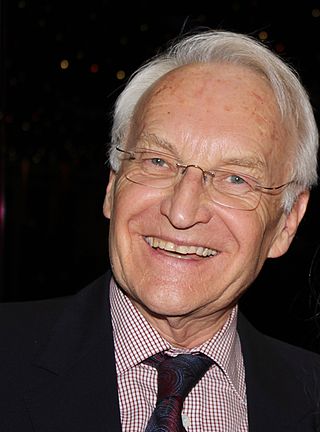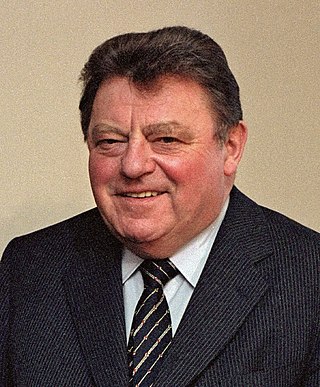Related Research Articles

The Christian Social Union in Bavaria is a Christian democratic and conservative political party in Germany. Having a regionalist identity, the CSU operates only in Bavaria while its larger counterpart, the Christian Democratic Union (CDU), operates in the other fifteen states of Germany. It differs from the CDU by being somewhat more conservative in social matters, following Catholic social teaching. The CSU is considered the de facto successor of the Weimar-era Catholic Bavarian People's Party.

Edmund Rüdiger Stoiber is a German politician who served as the 16th minister-president of the state of Bavaria between 1993 and 2007 and chairman of the Christian Social Union (CSU) between 1999 and 2007. In 2002, he ran for the office of Chancellor of Germany in the federal election, and in one of the narrowest elections in German history lost against Gerhard Schröder. On 18 January 2007, he announced that he would step down as minister-president and as party chairman by 30 September, after having been under fire in his own party for weeks.

The Christian Democratic Union of Germany is a Christian democratic and conservative political party in Germany. It is the major catch-all party of the centre-right in German politics.

Franz Josef Strauss was a German politician. He was the long-time chairman of the Christian Social Union in Bavaria (CSU) from 1961 until 1988, member of the federal cabinet in different positions between 1953 and 1969 and minister-president of the state of Bavaria from 1978 until 1988. Strauss is also credited as a co-founder of European aerospace conglomerate Airbus.

The Landtag of Bavaria, officially known in English as the Bavarian State Parliament, is the unicameral legislature of the German state of Bavaria. The parliament meets in the Maximilianeum in Munich.

The Republicans is a national-conservative political party in Germany. The primary plank of the programme is opposition to immigration. The party tends to attract protest voters who think that the Christian Democratic Union (CDU) and the Christian Social Union of Bavaria (CSU) are not sufficiently conservative. It was founded in 1983 by former CSU members Franz Handlos and Ekkehard Voigt, and Franz Schönhuber was the party's leader from 1985 to 1994. The party had later been led by Rolf Schlierer, until 2014. The Republicans had seats in the European Parliament between 1989 and 1994, Abgeordnetenhaus of West Berlin in 1989–1990 and in the parliament of the German state of Baden-Württemberg between 1991 and 2001.

The 2003 Bavarian state election was held on 21 September 2003 to elect the members to the 15th Landtag of Bavaria. The Christian Social Union (CSU) led by Minister-President Edmund Stoiber achieved the largest majority in German history, winning 69% of the seats in the Landtag. This election was the first and to date only time a single party won a two-thirds supermajority of seats in any German state parliament. The CSU also won its largest proportion of the popular vote since 1974, at 60.7%.

Günther Beckstein is a German CSU politician from Bavaria and was the 17th Minister President of Bavaria from 9 October 2007 to 27 October 2008. He is well known for his outspoken views on law and order.

Franz Xaver Schönhuber was a German right-wing extremist journalist, politician, and author. He gained fame as a founder and eventual chairman of the right-wing German party The Republicans. He was a member of the Waffen-SS during World War II.
CDU/CSU, unofficially the Union parties or the Union, is a centre-right Christian democratic and conservative political alliance of two political parties in Germany: the Christian Democratic Union of Germany (CDU) and the Christian Social Union in Bavaria (CSU).

The German Social Union is a small conservative political party mainly active in the new states of Germany. It was founded in 1990 as a right-wing opposition group during the Wende transition to democracy in East Germany, when it was part of the Alliance for Germany electoral coalition. After 1990, it fell into insignificance, only holding a few seats on the local level.

The 2008 Bavarian state election was held on 28 September 2008 to elect the members of the Landtag of Bavaria. The result was a historic defeat for the Christian Social Union (CSU), which had governed with a majority uninterrupted since 1962, and had won over 60% of the vote in the 2003 election. Despite polling suggesting that the party would retain its majority with losses, it suffered a 17% swing and came up two seats short of a majority, its worst result since 1954. Minister-President and CSU leader Günther Beckstein subsequently resigned from both posts, and the Landtag elected Horst Seehofer as his successor after the CSU and Free Democratic Party (FDP) came to a coalition agreement.
Harald Neubauer was a German politician and journalist from the far right scene. He was a Member of the European Parliament from 1989 to 1994.

Franz Wendelin "Hanns" Seidel was a German politician who served as Minister-President of Bavaria from 1957 to 1960. He was a member, and from 1955 to 1961 chairman, of the Christian Social Union of Bavaria.
The Economic Reconstruction Union was a German political party that was active immediately in Allied-occupied Germany after the Second World War. Although usually translated into English as the Economic Reconstruction Union it is also sometimes known as the Union for Economic Reconstruction, the Economic Reconstruction Association, or the Economic Reconstruction Party.

Deggendorf is an electoral constituency represented in the Bundestag. It elects one member via first-past-the-post voting. Under the current constituency numbering system, it is designated as constituency 226. It is located in southeastern Bavaria, comprising the districts of Deggendorf and Freyung-Grafenau.
August Haußleiter was a German politician and journalist. After his exclusion from the Bavarian Christian Social Union in 1949 he spent three decades as a right-wing political activist, on many occasions positioned beyond the frontiers of West Germany's consensual political mainstream. During the 1980s he remained politically active, but now as a somewhat unconventional member of the German Green party. He is also the mentor of the Finnish Greens.

The 2018 Bavarian state election took place on 14 October 2018 to elect the 180 members of the 18th Landtag of Bavaria. The outgoing government was a majority of the Christian Social Union in Bavaria (CSU), led by Minister President Markus Söder.

Ursula Männle is a German Social sciences academic and politician (CSU). She served between 1983 and 1994 as a member of the Bundestag. More recently, between 2000 and 2013, she was a member of the Bavarian Landtag, chairing an important parliamentary committee and, till 2009, chairing the women's working group in the Landtag.

The 1958 Bavarian state election was held on 23 November 1958 to elect the members of the Fourth Bavarian Landtag, and was notable for being held in the midst of the Casino Affair, which indicted several Bavarian politicians in the previous government on charges of corruption.
References
- ↑ "Franz Handlos ist tot". Wochenblatt.de. Archived from the original on 24 June 2013. Retrieved 20 June 2013.
- ↑ D. Art, The Politics of the Nazi Past in Germany and Austria, Cambridge, 2006, p. 147
- ↑ Russell J. Dalton, Germany Divided: The 1994 Bundestag Elections and the Evolution of the German Party System, 1996, p. 134
- 1 2 3 Cas Mudde, Ideology of the Extreme Right, 2002, p. 31
- ↑ Andreas Schulze, Kleinparteien in Deutschland, 2004, p. 104